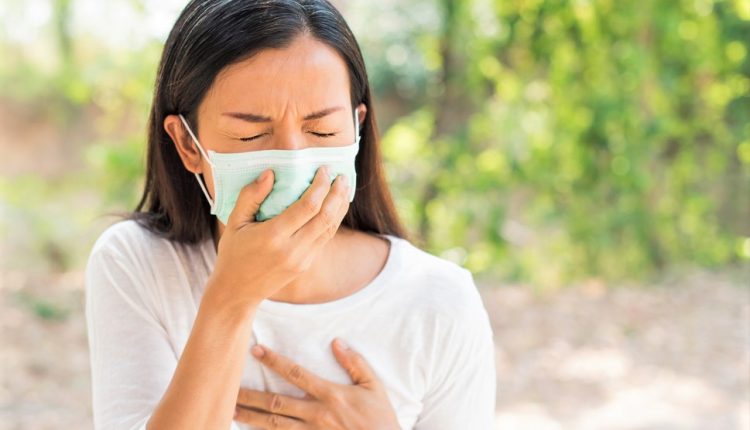
Allergic asthma: causes, symptoms, diagnosis and treatment
Allergic asthma is an inflammatory disease of the respiratory system caused by the presence of allergens: pollen, dust, dust mites, pet dander, etc.
The typical symptoms of this disease are usually chronic or intermittent and involve the bronchi, with a sudden narrowing of the airways (bronchospasm) and excessive mucous production.
The two phenomena, singly or together, make breathing difficult, create an air ‘hunger’ (dyspnoea), cause wheezing, with a typical whistling or wheezing sound, and often lead to coughing fits that make breathing even worse.
Its symptoms vary greatly from person to person.
Asthma is a chronic disease that cannot be cured, but is fairly effectively controlled in both children and adults.
What is allergic asthma?
It is a disease of the respiratory system caused by allergens that cause inflammation of the bronchial tree.
The basic mechanisms of this disease are not yet fully understood, but are attributed to a reaction of the immune system caused by inhaling allergens, particles dispersed in the environment to which the body is sensitive: pollen, dust, mites, pet dander.
The effects of this sensitivity affect the bronchi, structures of the respiratory system that are indispensable for the passage of air into the lungs.
In this type of asthma, the bronchi become inflamed, making breathing difficult.
What are the causes of allergic asthma?
Asthma is triggered by allergens, usually protein substances present in certain particularly volatile and easy to inhale agents such as pollen, dust, pet dander, but also mites and other insects.
Most people do not complain of any problems in the presence of these factors in the environment in which they live and breathe, while others, asthmatic subjects, probably due to a genetic and hereditary predisposition, suffer an abnormal and excessive reaction of the immune system.
A chain of factors eventually produces the inflammation of the bronchi and the alteration of their normal function.
What are the symptoms of allergic asthma?
Asthma symptoms vary from person to person.
They can be mild or more severe.
They can occur continuously (chronic), acutely or intermittently and temporarily, even a long time from one crisis to the next.
Generally, the symptoms of the disease are
- coughing fits, often violent and generally dry;
- shortness of breath or laboured breathing (dyspnoea);
- a weight on the chest;
- wheezing, characterised by whistling and moaning;
- sleep disturbances;
- difficulty performing everyday actions, such as climbing stairs or walking, and all strenuous physical activities.
How to prevent allergic asthma?
Prevention is an essential weapon in the control of allergic asthma.
It consists of taking all possible precautions to avoid contact with allergens known to sensitise the asthmatic’s bronchi and mucosa.
Frequent cleaning of home and work environments should be observed, paying attention to objects such as armchairs, sofas, carpets, pillows, beds and linen, and air conditioners.
Optimal humidity should be maintained in the living environment, avoiding climates that are too dry or too humid.
Outdoors, it is useful to cover your mouth and nose with a scarf if it is cold or a mask if it is hot or the place is particularly polluted.
Absolutely avoid smoking, eat a balanced diet, and do not gain excess weight.
Diagnosis of allergic asthma
The diagnosis of allergic asthma is obtained by the following standard examinations:
- Allergy skin test (Prick test);
- Rast test, a serological test for IgE immunoglobulins responsible for the allergic reaction;
- Respiratory function test, to measure lung capacity;
- Spirometry, to measure the amount of air entering the lungs;
Allergic asthma can also be diagnosed through more specific tests such as:
- Bronchial provocation test, to measure the nitric oxide present in the emitted (exhaled) air, which indicates the level of inflammation;
- Diagnostic imaging, X-rays and CT (computed tomography) scans that can highlight any abnormalities of the lungs and airways in general;
- Bronchial provocation test with methacholine;
- Peak expiratory flow measurement;
- Carbon monoxide diffusion test;
- Sputum examination;
- Arterial haemogas analysis.
Treatments
The treatment of asthma depends very much on the severity of the symptoms, age, duration of the disease and the presence of other diseases.
The first treatment consists of avoiding, whenever possible, the allergen(s) responsible for the pathology.
In the event of a crisis, but not only, allergic asthma is treated with bronchodilators and corticosteroids, nebulised through inhalation dispensers.
The same drugs, if used correctly and continuously, effectively control the symptoms.
Antileukotrienes are a class of drugs for oral use that can help rapidly relieve asthma symptoms, but unlike other molecules have more side effects.
Desensitising therapy or specific immunotherapy with allergenic extracts is a treatment that gradually trains the immune response typical of an allergic reaction, reducing the number and intensity of acute episodes.
It has a long duration.
Read Also:
Emergency Live Even More…Live: Download The New Free App Of Your Newspaper For IOS And Android
Adverse Drug Reactions: What They Are And How To Manage Adverse Effects
First Aid: 6 Must-Have Items In Your Medicine Cabinet
Allergies: Antihistamines And Cortisone, How To Use Them Properly
Asthma, The Disease That Takes Your Breath Away
Asthma: From Symptoms To Diagnostic Tests
Severe Asthma: Drug Proves Effective In Children Who Do Not Respond To Treatment
Asthma: Tests For Diagnosis And Treatment




